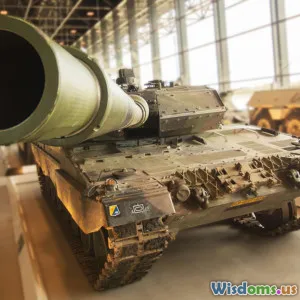
Enhancing Military Strategies with AI
9 min read Explore how AI revolutionizes military strategies for future combat effectiveness. (0 Reviews)
Enhancing Military Strategies with AI: Unleashing Potential for Future Warfare
Artificial Intelligence (AI) is rapidly transforming various industries, but its impact on military strategies is particularly profound. As global tensions rise and warfare becomes increasingly complex, leveraging AI provides defense forces with a strategic edge. This article examines how AI enhances military capabilities, focusing on its applications, challenges, and the implications for future warfare.
The Rising Tide of Military Technology
In an era where military conflicts are often fought in diverse settings, from urban environments to cybersecurity domains, it is crucial for military organizations to adopt innovative technologies. AI stands out among them; with capabilities such as data analysis, autonomous systems, and predictive modeling, it offers an invaluable toolkit for military planners. According to a report by the Center for a New American Security, many countries are investing heavily in AI for defense, with the U.S. earmarking billions for research and development (R&D) in AI applications for military use.
1. Applications of AI in Military Strategies
a. Autonomous Weapons Systems
One of the most controversial and significant applications of AI is in autonomous weapons systems. These systems use AI algorithms to identify, track, and engage targets without human intervention. For instance, the U.S. Department of Defense is developing technologies such as drones capable of conducting reconnaissance missions and combat operations independently. The MQ-9 Reaper drone, for example, leverages AI for target identification, which increases surveillance capabilities significantly.
b. Decision Support Systems
In military operations, timely and strategic decision-making can make the difference between success and failure. AI-powered decision support systems act as real-time assistants to commanders in the field. By analyzing huge volumes of data—from drone footage to battlefield intelligence—AI provides actionable insights and predictive analytics. During the war in Afghanistan, the U.S. military utilized these systems with great success, proving to be essential in resource allocation and mission planning.
c. Cybersecurity
An often overlooked but critical aspect of modern warfare is cybersecurity. AI technologies can automatically detect and respond to cyber threats in milliseconds. The use of AI in cybersecurity enhances efforts to protect sensitive military information and infrastructure. For example, the Defense Advanced Research Projects Agency (DARPA) launched projects like Plan X, which aims to apply AI in the context of cyber operations to neutralize hostilities before they escalate.
d. Logistics and Supply Chain Management
Efficient logistics are essential for sustained military operations. AI can streamline supply chain management by predicting demands, optimizing routes, and reducing costs. The U.S. Army's Logistics Modernization Program integrates AI to analyze data from various sources, significantly enhancing its capability to manage supplies and reduce waste, which allows forces to remain agile on the battlefield.
2. Enhancing Training and Simulation
a. Virtual Training Environments
AI can revolutionize military training through immersive simulations and realistic scenarios. Platforms like Synthetic Training Environment (STE) leverage AI technologies to create realistic training simulations for soldiers, improving readiness without increasing cost or risk associated with live exercises. By adapting scenarios based on a participant's decisions, AI provides tailored training experiences, making preparation for various combat scenarios more effective.
b. Data-Driven Performance Analysis
Using AI to analyze soldier performance during training also aids in refining tactics and strategies. Systems can assess the effectiveness of individual soldiers and units, providing detailed insights that lead to personalized training programs.
3. The Ethical Debate surrounding AI in Military Decisions
While AI's potential in military strategies is significant, it also raises ethical concerns. The prospect of autonomous weapons systems making life-and-death decisions without human oversight prompts heated debates among ethicists, legal experts, political leaders, and the public. Prominent figures, like former Google CEO Eric Schmidt, have stated that we should develop guidelines to prevent autonomous robots from acting without accountability.
a. International Regulations
Efforts to establish international norms governing the use of AI in military applications are crucial. The United Nations is playing an active role in facilitating discussions about autonomous weapons, with pressure from several countries advocating for a ban on lethal autonomous robots.
b. Human Oversight as a Prerequisite
While AI may enhance decision-making, maintaining human oversight in military actions is vital. Ensure that decisions regarding the use of lethal force always incorporate human values and accountability as the backbone of operations.
4. Challenges and Limitations
Despite AI's transformative potential, implementing these technologies effectively in military strategies presents several challenges.
a. Technological Limitations
AI systems depend heavily on quality data. In chaotic battlefield environments, data may be incomplete or inaccurate, leading to potential decision-making errors. In the 2020 Naval Operational Training Setup trials, numerous AI applications failed to produce reliable outcomes due to these limitations.
b. Security Concerns
AI systems are not immune to adversarial manipulation. Countries with lower investment in AI capabilities can target vulnerable systems, potentially rendering these innovations useless. Therefore, military organizations must prioritize cybersecurity in AI systems to protect sensitive data and weaponry from foreign threats.
c. Integration with Existing Systems
Integrating AI into established military frameworks is also a considerable challenge. Examples have shown that lack of compatibility with legacy systems can result in operational inefficiencies and increase costs, occasionally hindering the adoption of AI altogether.
Conclusion: The Future of Military Strategies with AI
The integration of AI into military strategies is not just an option; it is an imperative as conflicts become more sophisticated in the modern age. While there are ethical, technological, and logistical challenges to consider, the benefits of enhanced decision-making, better training, improved autonomy, and robust cybersecurity are clear. As nations endeavor to harness the potential of AI, cooperative international discourse on its implications remains crucial to ensuring its responsible development and deployment. The AI influence over military strategies signals a new chapter in military technology—a chapter that nations must navigate carefully, balancing innovation with ethical responsibility.
Investing in AI not only redefines the battlefield but also, potentially, the future of international relations. Nations committed to AI advancements have a tremendous opportunity to enhance military strategies and preparedness.
Rate the Post
User Reviews
Popular Posts





















